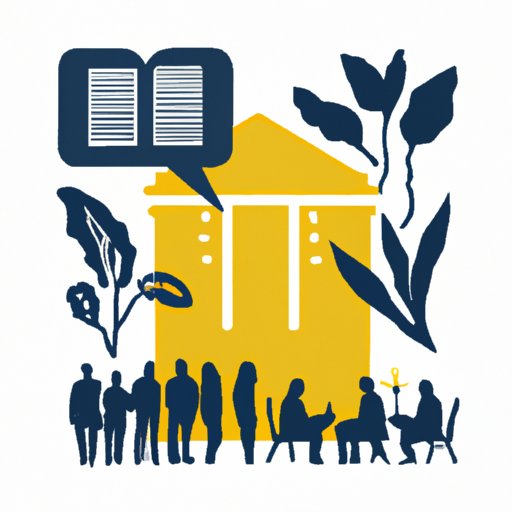I. Introduction
Religion has been a central part of human existence for thousands of years. It has shaped our history, culture, and identity in profound ways and continues to play a prominent role in our lives today. Religion is often seen as a way to connect with the divine, but it is also a powerful tool for personal development. In this article, we will explore the influence of religion on personal development, including spiritual growth, community affairs, faith-based education, moral and ethical development, interfaith dialogue, and psychological benefits.
II. Historical and Cultural Significance
Religion has had a profound impact on human history and culture. From the ancient civilizations of Greece and Rome to the modern-day world, religion has influenced every aspect of human life. Different religions and societies have contributed to the development of art, literature, music, and architecture, as well as shaping social and cultural norms. Understanding the historical and cultural significance of religion is crucial for personal development, as it provides a context for our beliefs and values.
III. Spiritual Growth
Religious practices and rituals play a crucial role in personal development. Practices such as prayer, meditation, fasting, and pilgrimage can promote spiritual discipline, self-reflection, and emotional intelligence. Different religions have unique practices that can lead to spiritual growth and wellbeing. For example, meditation is a central practice in Buddhism, while prayer plays a fundamental role in Christianity and Islam. Spiritual growth can also contribute to mental health and wellbeing, helping to reduce stress and anxiety.
IV. Community Affairs
Religious groups have a significant impact on society, playing an essential role in community affairs such as charity, social justice, and interfaith activism. Religious communities can promote social cohesion, tolerance, and cooperation, which can lead to a more harmonious and inclusive society. However, there are also challenges and opportunities associated with engaging with religious communities. For example, some religious groups may hold conservative or outdated views, which can hinder progress in areas such as gender equality and LGBT rights.
V. Faith-based Education
Religious education provides an essential foundation for personal development. It helps individuals acquire knowledge, skills, and values that are essential for personal growth and development. Faith-based education can also contribute to a deeper understanding of one’s faith and spiritual fulfillment. However, there are both benefits and drawbacks to faith-based education, and different approaches are taken across different religions. For example, some religions focus on memorization and recitation of sacred texts, while others emphasize critical thinking and inquiry-based learning.
VI. Moral and Ethical Development
Religious teachings and values can inform moral and ethical decision-making. Different religions have unique moral codes and ethical frameworks that govern behavior and decision-making. These frameworks provide individuals with a moral compass for daily life and guide social and political action. However, there are also challenges and criticisms of religion-based morality, such as the potential for intolerance and discrimination. Finding a balance between individual beliefs and societal values is crucial for personal and social development.
VII. Interfaith Dialogue
Interfaith dialogue is crucial for personal and social development, promoting religious tolerance and understanding. It is a way to explore and appreciate different religious traditions, build bridges across cultural divides, and promote a more inclusive and peaceful society. There are different models and methods of interfaith dialogue, such as conferences, dialogues, and seminars. However, there are also challenges associated with engaging in interfaith dialogue, such as biases and misunderstandings.
VIII. Psychological Benefits
There are various psychological benefits associated with religion. For many people, religion can provide comfort, hope, meaning, and resilience in difficult times. The link between religion and mental health is complex, with some studies suggesting that religion can contribute to mental wellbeing, while others suggest that it can lead to psychological distress. Additionally, spirituality is increasingly being recognized as an essential component of psychotherapy.
IX. Conclusion
Religion can have a profound impact on personal development, influencing spiritual growth, community affairs, faith-based education, moral and ethical development, interfaith dialogue, and psychological benefits. Understanding the role of religion in personal development can help individuals find meaning and purpose in their lives, connect with others, and contribute to a more pluralistic and tolerant society. To incorporate religion into personal development, individuals can explore the practices and teachings of different religions, engage in interfaith dialogue, and seek support from religious communities. Ultimately, personal development is a journey that requires ongoing reflection, dialogue, and growth.
(Note: Is this article not meeting your expectations? Do you have knowledge or insights to share? Unlock new opportunities and expand your reach by joining our authors team. Click Registration to join us and share your expertise with our readers.)
